 |
| New York : Appleton-Century-Crofts, 1948 |
Don returns home to Ashton, Mississippi after having left for New York and struggling there in the Depression of the 1930s. His mother needs him to care for her after his father's death and now that he's back, wants to monopolize his time to the exclusion of his friends and love interests. His best friend, Jim, had married Doris before Don left Ashton, thus closing off their relationship. Upon his return, unresolved feelings and societal expectations come to the fore. Can Don and Jim simply be friends after having loved one another in the past? Are they still interested in being friends? How do they handle the expectation to marry and have children? Is it fair to any woman for a gay man to marry her?
Set during the 1930s in a small town, it is an environment where everyone knows everyone else's business while everyone simultaneously believes that their struggles are their own inner secret. Creekmore highlights the significant social changes during the interwar years and how various characters have adjusted at different speeds and to different levels. What do men's friendships look like? What is an acceptable level of closeness between men? What is the role of women? Must they marry? What does it say about them if they don't.
Tray, a childhood friend to both Don and Jim is seen by some as basic—certainly not among the elite of the town. He, on the other hand, accepts everyone for who they are and is depicted as both the everyman as well as the sage advisor to both of his friends. Tray offers these wise words that speak to the theme of the book and speak to the individual struggles of all of the characters: "If only people could forgive each other for loving."
Written in close third person, the reader comes to understand how each character thinks of their place in the world and the few options they perceive themselves to have. Particularly in Part One, as the author introduces the characters, he uses that close third to excellent effect by focusing a chapter on a particular character, introducing another character during the action of the chapter who then leaves by the end only to show up as the focus of the subsequent chapter. It's a skillful way of creating the community of Ashton and assisting the reader in understanding the characters' relationships to one another.
Creekmore doesn't rely on simple resolutions either—such as killing off one or both of the gay protagonists which might have been more typical of the time. Likewise he also doesn't give us a happily ever after ending. The lives he presents are complex and allowing the characters to be complicated, with difficult choices to make, results in a story that feels real— both relatable and believable.
 |
| Jackson : University Press of Mississippi, 2023 |
After being out of print and virtually unfindable for decades, Phillip Gordon has shepherded a 2023 reissue through The University Press of Mississippi to which he has also provided an introduction. Gordon places The Welcome within the context of what little is known about Creekmore's life, particularly his friendship with Eudora Welty. For those interested in early gay literature, especially as regards life in the rural south, Mr. Gordon has done the world a great service by reviving this lost gem.
Bibliographies & Ratings: Cory (IV); Garde (Primary 73, **); Mattachine Review (IV); Young (848,*)
Bibliographies & Ratings II: Austen (116); Gunn (American 41a); Levin (80); Slide (15)
%20(1911%E2%80%9312)_67x47cm.jpeg)